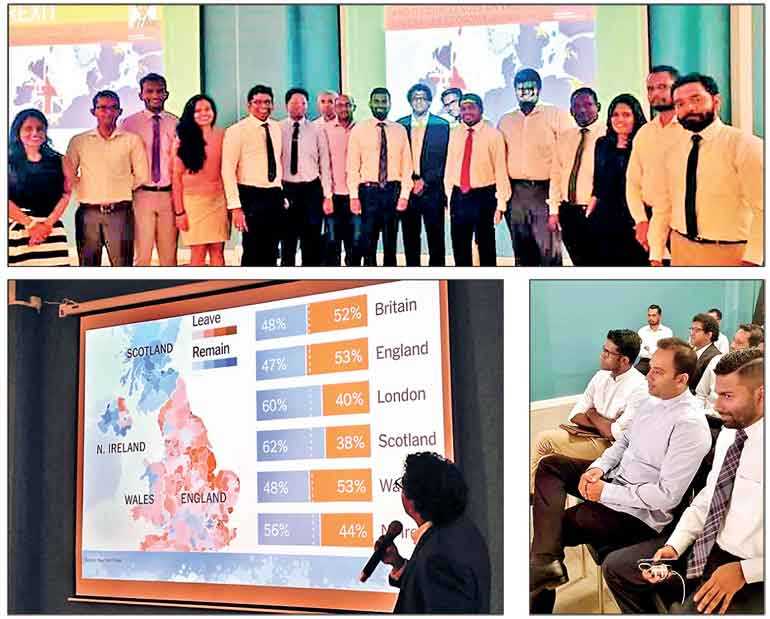Monday Feb 23, 2026
Monday Feb 23, 2026
Wednesday, 10 April 2019 02:01 - - {{hitsCtrl.values.hits}}

On the post-Brexit scenario, Sri Lanka needs to push for regular bilateral trade and investment dialogues with the United Kingdom, while finding other compatible markets within the European Union to minimise the short-term economic shocks of Brexit on our export sector, a leading trade economist said.
Kithmina Hewage, an economist from the Institute of Policy Studies, spoke at a forum held recently on ‘Brexit and its impact to Sri Lanka’, organised by the Colombo Chapter of the Young Professionals Organisation, which saw the attendance of many industry professionals as well as the Chairman of the Young Professional Organisation, Harshana Rajakaruna.
He further noted that even in an immediate No Deal post-Brexit situation, the British Government has committed to continue extending GSP+ concessions to Sri Lanka and other developing countries. However, this commitment is subject to the passage of the relevant secondary legislature in Parliament.
“Amidst these assurances, our exporters have to plan and prepare for an era of no GSP Plus concessions in the future, as we will lose such preferences on graduating to high-middle income status in 3-5 years,” Hewage quipped.
GSP Plus concessions are only eligible for countries that are deemed low and low-middle income. Therefore, Sri Lanka needs to urgently improve its economic competitiveness, in order to grow its export sector and attract FDI.
Sri Lankan export basket composition has only seen a marginal change in almost 25 years and is still dominated by apparel, tea, and rubber, while regional economies, especially the Asian Tigers, have increased exports multifold to high value-added exports, such as consumer electronics.
“Sri Lanka’s export basket hasn’t changed that much from 1995, while the rest of the region has fared much better,” Hewage said.
Vietnam, Thailand and Malaysia were much like Sri Lanka 25 years ago, and were dependent on low value added exports such as coffee, rice, crude petroleum, rubber and apparel. Vietnam changed in mid-90’s and attracted Foreign Direct Investments, which integrated their economy to global value chains to manufacture consumer electronics such as mobile telephones, computers, semiconductors, and office machinery and parts. However, Hewage says Sri Lanka has been left behind, due to the period of the conflict and unfavourable, inconsistent, and protectionist policies that have led to inefficiencies in the economy. This was one of the primary reasons for Sri Lanka not fulfilling its post-conflict growth dividend.
‘Sri Lanka has missed the bus. It’s not too late, but policy has to change to focus on attracting efficiency-seeking, rather than incentive-seeking FDI. Sri Lanka needs to increase trade and investment partnerships with other regions,” Hewage concluded.